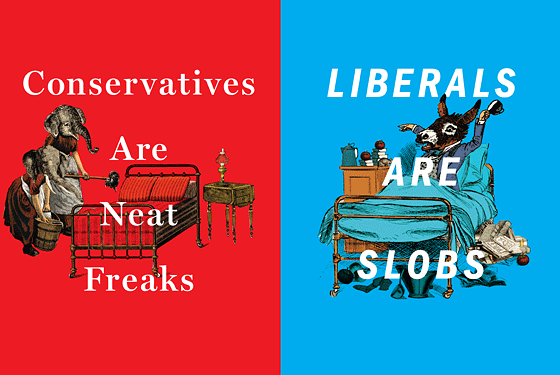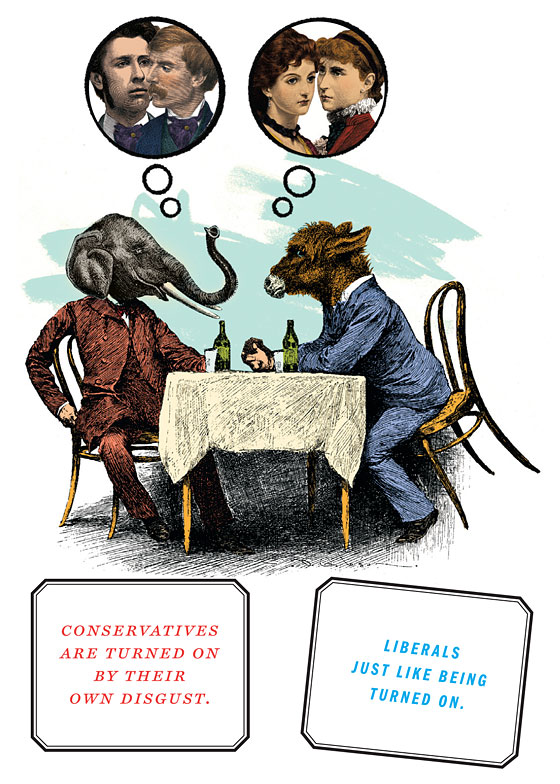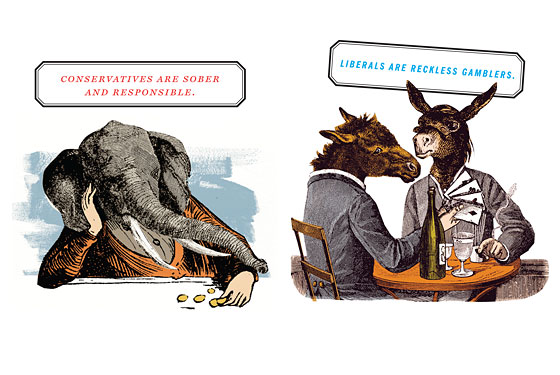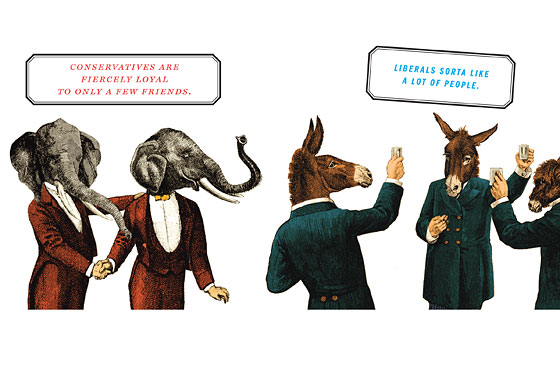Born This Way
The new weird science of hardwired political identity.
 |
Collage by Gluekit |
Afew weeks before the 2008 election, Democratic strategists were running out of ideas for how to help Al Franken. His race against incumbent Minnesota senator Norm Coleman was a stubborn one: Even after some of the country’s highest ever per capita spending, the contest remained close, with a small number of undecided, seemingly unbudgeable voters.
The job of pollsters in these situations is to figure out who the undecided actually are and what could make them move. Often, they focus on demographics (playing to older suburban women) or issues (talk of school reform). But one pollster working for the Democratic Senatorial Campaign Committee, Mark Mellman, felt it might pay to look for more primal distinctions.
Mellman added to his Minnesota polls a battery of questions inspired by research in psychology and neuroscience, borrowed from personality tests and designed to separate those with more rational processing systems from those who relied on emotion in their decision-making. Here polls did discern a latent split: Franken led Coleman by one point among those they identified as “feelers” but lagged by seven points among “thinkers.” The committee changed its ad strategy in response. Highly stylized television spots, like a movie spoof that showed Coleman as a fugitive fleeing George W. Bush, were replaced by messages that were “a little more flat, a little more factual, a little more sourced,” Mellman said. One defended Franken against Coleman’s charges with a calm narrator reading off a checklist of straightforward rebuttals under the words “The Truth.” Franken won, after a long recount, and in 2010 Mellman used the same battery of questions to shape media strategy for Harry Reid and Barbara Boxer.
That kind of science may seem alien to the war room, but Mellman’s hunch, that the differences in how people process politics may be more innate than we’ve thought, is becoming the default assumption in research labs worldwide. There, over the last decade or so, scientists have been extending to politics the imperious insights of neuroscience and evolutionary psychology that have so shaken other social sciences.
At the vanguard of this movement is Jonathan Haidt, a moral psychologist whose best-selling new book,The Righteous Mind, collects his own experiments—testing biases, prejudices, and preferences—and the work of like-minded colleagues to unmask much of our political “thinking” as moral instinct papered over, post facto, with ideological rationalization. We may tell ourselves that we believe welfare is just or that abortion violates the sanctity of life, but we’re really using borrowed language to express much more visceral attitudes, oriented around one of six moral dials—harm, fairness, loyalty, authority, liberty, and sanctity. Much of what passes for the daily scrum of electoral politics, he says, is merely an effort to find language that can help citizens justify these instincts. “Once people join a political team, they get ensnared in its moral matrix,” Haidt writes. “They see confirmation of their grand narrative everywhere.”
But the new science of primal politics goes quite a bit deeper than psychology. Over the past few years, researchers haven’t just tied basic character traits to liberalism and conservatism, they’ve begun to finger specific genes they say hard-wire those ideologies. If that work is to be believed, it would mean that an individual’s path to a political identity starts not with a series of choices but with long-ago genetic mutations, and that our collective experience of politics may be less a battle of ideas than a Darwinian contest in which we are all unwitting participants. After a team of geneticists claimed in a 2005 American Political Science Review article that they had evidence of DNA’s influence on politics, Duke political scientist Evan Charney rebutted that their findings “would require nothing less than a revision of our understanding of all of human history, much—if not most—of political science, sociology, anthropology, and psychology, as well as, perhaps, our understanding of what it means to be human.”
The thing most in need of revising may be our reflex for self-flattery. We revel in the idea that personal politics are perfectly deliberative, never more than in a year when Barack Obama and Mitt Romney—two dispassionate rationalists with great confidence in their skills of persuasion—will cross the country to win over their fellow citizens’ hearts and minds. But the comforting metaphor of a grand national debate to determine where the swing voters will end up has never seemed so out of sync with trending science. After all, what is the point of everything that happens between now and November 6 if our wiring dictates how we vote?
In 2006, as political scientists fixated on the country’s red-blue divide, NYU psychologist John Jost delivered a paper titled “The End of the End of Ideology.” For years, scholars had believed that the differences between liberals and conservatives were both trivial and superficial—that the two major American political parties weren’t all that far apart and that voters’ loyalties to them were simply arbitrary. Some had become convinced that people attached themselves to an ideology merely to assert their sophistication, picking a side to show they were capable of articulating a coherent worldview—that, as Haidt suggests, partisanship was merely an intellectual superstructure.
 |
Collage by Gluekit |
But Jost believed there was something deeper to political identity, something that might explain why there has been so much continuity, and so little shape-shifting, in the politics of the modern West. Ever since French parliamentarians decided their seating arrangements in the eighteenth century, the two-way split between left (concerned with inequality and eager for social change) and right (guardians of tradition and satisfied with an uneven spread of resources) has remained remarkably constant across time and place. As new issues have emerged, opinions on them have lined up very neatly with the old patterns—patterns so consistent they cannot be arbitrary and so peculiar it’s hard to believe they are fully rational. Why in the American system were the people who opposed the death penalty almost always the ones who believed that rich people should pay more in taxes? Why are those concerned with Net neutrality the same people obsessed with local produce? Why do support for strong regulation of abortion and weak regulation of the financial sector seem to go together?
Jost wanted to find out and, with a group of colleagues, set off to map the psychological infrastructure of politics. They didn’t bother asking people about cap-and-trade or gun control, but focused on jazz, masturbation, and gardening. What they discovered was a series of contrasts: Conservatives approved of documentaries and going to bars; liberals looked favorably upon motorcycles and singing songs. In earlier studies, liberals had been shown to be unpredictable and uncontrolled, conservatives conscientious and trustworthy. Jost found that liberals embraced those considered outside the social mainstream, like lesbians, “street people,” and atheists; conservatives approved of fraternities and sororities, politicians, and Caucasians. Conservatives were fonder of children, liberals of professors. Among women, conservatives were more into sex; among men, Jost and his colleagues found the opposite.
They also visited the rooms of 76 UC-Berkeley students, along with a series of five nearby offices, and coded nearly every item in the rooms after quizzing the spaces’ inhabitants about their attitudes. Conservatives’ bedrooms had more laundry baskets, postage stamps, and sports memorabilia. Liberals had movie tickets and larger collections of CDs and books. Conservatives had calendars, flags, and ironing boards. Liberals had international maps, art supplies, and stationery. Conservative offices were less “stylish” and “comfortable”; liberal workplaces were more colorful. When Jost and his colleagues videotaped three-minute interviews with the students, then reviewed the tapes, the liberals were chattier, the conservatives withdrawn and cautious.
Jost’s goal wasn’t to confirm the cheap ideological caricatures of columnists—although the paper does a magnificent job of it—but to see what people’s not obviously political characteristics might explain about how their minds work. “As a general rule,” the authors wrote, “liberals are more open-minded in their pursuit of creativity, novelty, and diversity, whereas conservatives seek lives that are more orderly, conventional, and better organized.” Rare midlife conversions aside, our parties are groups of two different kinds of people, they said, divided not by class or geography or education but by temperament.
Until recently, merely looking to sort people into political types was taboo, with its hint of Nazi eugenics. In the thirties, German psychologist Ernst Jaensch had isolated traits—“definite, unambiguous … tough, masculine, firm”—that would help to identify good candidates for National Socialism. After the war, American researchers backed away from any suggestion that personal politics came with birth, leaving political scientists to mine social explanations instead. In so doing, political science insulated itself from the hard sciences, leaving the discipline inadvertently perched on a bizarre assumption: Politics was the only sphere of human existence immune to hereditary influence.
Other disciplines were less intimidated by taboo. In 1989, UC-Berkeley developmental psychologists Jack and Jeanne Block tracked down just over 100 23-year-olds they had closely observed two decades earlier. In the late sixties, the Blocks had identified a set of students at Bay Area nursery schools and assigned personality characteristics to each child based on his or her behavior, alone as well as in groups, as part of a study on creativity and self-esteem. Twenty years later, the Blocks went back and started talking to them about politics, comparing answers to the personality traits they had observed in their subjects as toddlers. They found that even in nursery schools, liberals had been self-reliant and resilient, able to develop close relationships and willing to easily cast off routine. The conservatives had been distrustful of others and anxious when facing uncertainty, quick to take offense and experience guilt. The Blocks felt they had found that the origins of adult partisanship manifest at an age often defined by its innocence to the world of politics.
If the Blocks’ sandbox profiling is right, it would mean that ideologies are not free-floating philosophies to which free agents can attach themselves but manifestations of deeply held personality traits. Conservatism might not be that thing defined by William F. Buckley or Edmund Burke but a primal condition by which people hedge against disorder or change they can’t otherwise control. Perhaps the clearest marker that Rudy Giuliani is a conservative is the fact that he can’t truck messiness. Others on the right have made more high-minded appeals to the gross-out standard: Leon Kass, who chaired George W. Bush’s Commission on Bioethics, has promoted “the wisdom of repugnance” as a key value in making policy around issues like cloning. “We have basic emotions set up to deal with these challenges, whether it’s fear or anger or disgust,” says Brown University political scientist Rose McDermott. “That predisposition affects whether they’re conservative or liberal because it helps them organize the world in a way that reduces their fear.”
 |
Collage by Gluekit |
In 2008, Cornell psychologist David Pizarro tried to explain just how we interact with that fear. He and his colleagues had surveyed subjects about their political beliefs and then asked each how much he or she would be disgusted by the smell of urine, the sight of crawling maggots, or the knowledge that a bowl of soup had been stirred by a used flyswatter. People develop their gag reflexes long before they pick a political movement, Pizarro speculated, and many of the political debates that appear to be moral tests for adults eventually reveal themselves as little more than a measurement of childlike revulsion. Does prisoner torture or the sight of two men kissing or the nihilistic gore of Grand Theft Auto make you gag?
Those on the right were the most easily grossed out, Pizarro found, confirming our intuitive picture of live-and-let-live liberals and law-and-order conservatives. But research also showed that conservatives were not only turned off by flies, turds, and images of people fighting but that they were positively turned on by their own feelings of repugnance, especially in a related experiment conducted at the University of Nebraska–Lincoln. Researchers there outfitted subjects with an eye-tracker, which measured how and where participants focused their attention, before projecting collages mixing images that are known to trigger adverse reactions (spider, more maggots) and those that stimulate goodwill (cute rabbit, happy child). Unlike liberals’ eyes, conservatives’ eyes dwelled unusually long on images they found most repellent. Similarly, when researchers used electrodes to measure the amount of moisture released by subjects—a typical method of ascertaining emotional response—they found that conservatives were more aroused by images of politicians they disliked (the Clintons) than those they liked (Ronald Reagan, George W. Bush). Liberals were excited by the sight of those they liked.
In Man Is by Nature a Political Animal, published last year, the anthology’s editors argue that any open-minded pursuit of these questions will show that evolutionary impulses shape our political inner lives as much as our physical form. McDermott, one of the volume’s editors, predicts that within ten years saliva swabs will identify a genetic link explaining why some individuals welcome immigration while others respond violently to it. Citizens with “really strong immune systems are going to be all right with immigration,” McDermott ventures, because they’ll be less concerned with the pathogen threat that outsiders pose.
“It’s hard to find something we haven’t been able to say is significantly affected by the heritability of genes,” says James Fowler, a UC–San Diego social scientist. If genes can make someone more prone to depression or bad temper, why couldn’t they also explain his political views? And if genes were shaped over time by evolutionary pressures that drove people to protect their turf or successfully reproduce, why shouldn’t we see politics at least partly in the same terms?
“I know there’s a knee-jerk reaction that this can’t be right: ‘There’s no way there’s a gene that’s responsible for my politics,’ ” says Matthew C. Keller, a behavioral geneticist at the University of Colorado. “For me, this is a genetic IQ test. If they say that type of thing, it means they don’t understand genetics that well.”
To those immersed in the science, moral concerns have seemed to exhibit the strongest hereditary influence and to manifest themselves earliest in life. They are the most stable over a lifetime and the least susceptible to persuasion. That may explain why the most angry, permanent divisions in modern American politics have surrounded “God, guns, and gays” and why an intra-Republican truce on such cultural issues strikes nearly everyone as particularly fanciful. What if positions on these issues evoke the most primal responses because, in animal terms, they are most primal?
Such thinking would threaten the pieties of both left and right. Conservatives might have to adjust to a world in which few human failings could be fully blamed on cultural decline. At the same time, the liberal mind would be forced to rethink its posture toward cultural backwardness, and decide whether it ought to treat illiberal attributes like intolerance and racism as part of human nature. Would those who oppose discrimination against gays on the basis that sexuality is no choice still feel empowered to hate the right wing if they knew homophobes, too, were just born that way?
The question leads straight back, through behavior and heritability, to our DNA. In the mid-2000s, Fowler tried to isolate the effects of specific genes on civic engagement: Comparing the frequency of voting by identical twins (who share their DNA) against fraternal ones (who share half of it), Fowler and his team concluded that differentials in turnout patterns can be explained just as well by genetics as by learned behavior.
 |
Collage by Gluekit |
Fowler and his colleagues then went further to see if any of the 25,000 known human genes, which have been connected to conditions like dyslexia and depression, could be linked to political temperament. They concentrated on one of the first genetic variations to be connected with a particular personality type: DRD4-7R, a variant of the gene that encodes the brain’s dopamine receptors that had already been linked to novelty-seeking behavior. “It’s a reward system,” says Fowler. “It lights up when we eat chocolate or have sex or do cocaine. It’s the system that goes haywire when people have gambling addictions.” Fowler thought back to the personality studies by Jost and others that presented “openness” and “novelty-seeking” as liberal traits. If dopamine levels made someone more likely to go bungee-jumping, why wouldn’t they also lead him or her to a political party less guided by tradition?
To test the hypothesis, Fowler and his colleagues had to identify a group of liberals and see whether they were more likely to carry two copies of DRD4-7R. In the data from a previous study, he found 2,574 people identified as DRD4 carriers who had been asked about their politics and placed on a political continuum. There was not a direct connection between the gene and ideology, Fowler and his colleagues found, but when the researchers also looked at the number of friends the subjects had had in high school (one of the survey questions asked), they did find a strong tie. People with the genetic variant who had lively adolescent social lives were more likely to consider themselves liberal as young adults.
Even so, Fowler laughs at the idea that he had isolated a single gene responsible for liberalism—an idea circulated in much of the chatter about the study. “There are hundreds if not thousands of genes that are all interacting to affect complex social behaviors,” Fowler says, and scientists have only a rough sense of that process. “There’s a really long, complex causal chain at work here,” says UC-Berkeley political scientist Laura Stoker, “and we won’t get any real understanding without hundreds and hundreds of years’ more research.”
But a century is a long time to wait. The media coverage of Fowler’s “liberal gene” (“Don’t hold liberals responsible for their opinion—they can’t help themselves,” reported Foxnews.com) demonstrated just how much of an appetite there might be for teasing out the election-year implications of the new biological determinism. Should Republican strategists be activating conservative attitudes by reminding the base of the things that repulse them (maggots, Bill Clinton)? Would Democrats be smart to run their voter-registration drives near slot machines and bungee jumps? Is there something in the biological makeup of politicians like Obama and Romney that seems to make them more malleable than the people whose votes they want to win? (Now that we have the birth certificate, we’ll need a DNA swab.) Why does Romney seem quick to shift positions on the moral issues that should be most hardwired but faithful on the economic ones with weaker genetic inheritance? Does the fact that he’s a flip-flopper also mean he’s a robot? And what’s the deal with Obama’s bipartisan fetish, anyway—is that some kind of freak genetic mutation? Or further evidence that he’s hiding, as Romney would have it, a more sinister atavistic agenda? Instead of exalting independents, should we treat their lack of discernible ideology as evidence of their underdevelopment? And do Americans not have a third party because the laws of evolution won’t let one survive?
An election season’s arrival quickly sweeps away any such sense of political fatalism. Every four years, we treat our presidential campaign as an exercise in Tocquevillean political free will, 200 million Americans questioning their individual beliefs and national priorities unencumbered by lineage or patrimony. We rearrange our civic life around the cult of the ideologically unmoored voter—once called ticket-splitters, then swing voters, now just independents. But daily shifts in Biden’s language or Romney’s policy positions or the imagery of super-PAC ads are only worth the attention we lavish on them if they’re being judged by a perfectly open-minded electorate.
“You can be the best campaign, but if someone is genetically predisposed against being affected by it, you’re not going to make much of a difference,” says Fordham political scientist Costas Panagopoulos, former editor-in-chief of the trade magazine Campaigns & Elections. Even if the genetic studies don’t suggest that votes are truly automatic, efforts to get conservative Catholic union members to vote for Obama or liberal stockbrokers for Mitt Romney may be more doomed than we want to believe. Of course, we have long appreciated the role played by one biological predictor: the gender gap, which has become the most popular way to explain Obama’s lead over Romney as we head into the fall campaign.
Indeed, whatever we make of the academic breakthroughs in understanding the role of evolutionary psychology in politics, the old heuristics may have to suffice for now. Parties and candidates have few practical tools to sort voters into new biological categories and little sophisticated understanding of how to leverage any new insight. “It’s hard to put that on a survey,” notes Will Feltus, a Republican consultant who uses statistical modeling to advise campaigns on how to target their television buys. “ ‘I just have a few questions about your genetics. Which of the following genetic sequences is closest to your own?’ ”
It is easy to imagine that more data on how brains and bodies process political messages might just gussy up the logic of the red-blue divide with a scientistic certitude. Campaigns would be even more convinced that the people who are not for them today will never be for them and redouble resources on rousing the voters they know to be on their side and give up on trying to change minds. “For what I do, finding out whether someone is the way they are from childhood doesn’t help me a whole lot. I am being paid to tell politicians where people are, how changeable they can be within a twelve-to-eighteen-month period,” says Whit Ayres, a Republican pollster who worked on Jon Huntsman’s presidential campaign. “It’s just numbers. How many people are in this group, how many people are in that group, and how many people do you have to add to get to 50 percent?”
No comments:
Post a Comment